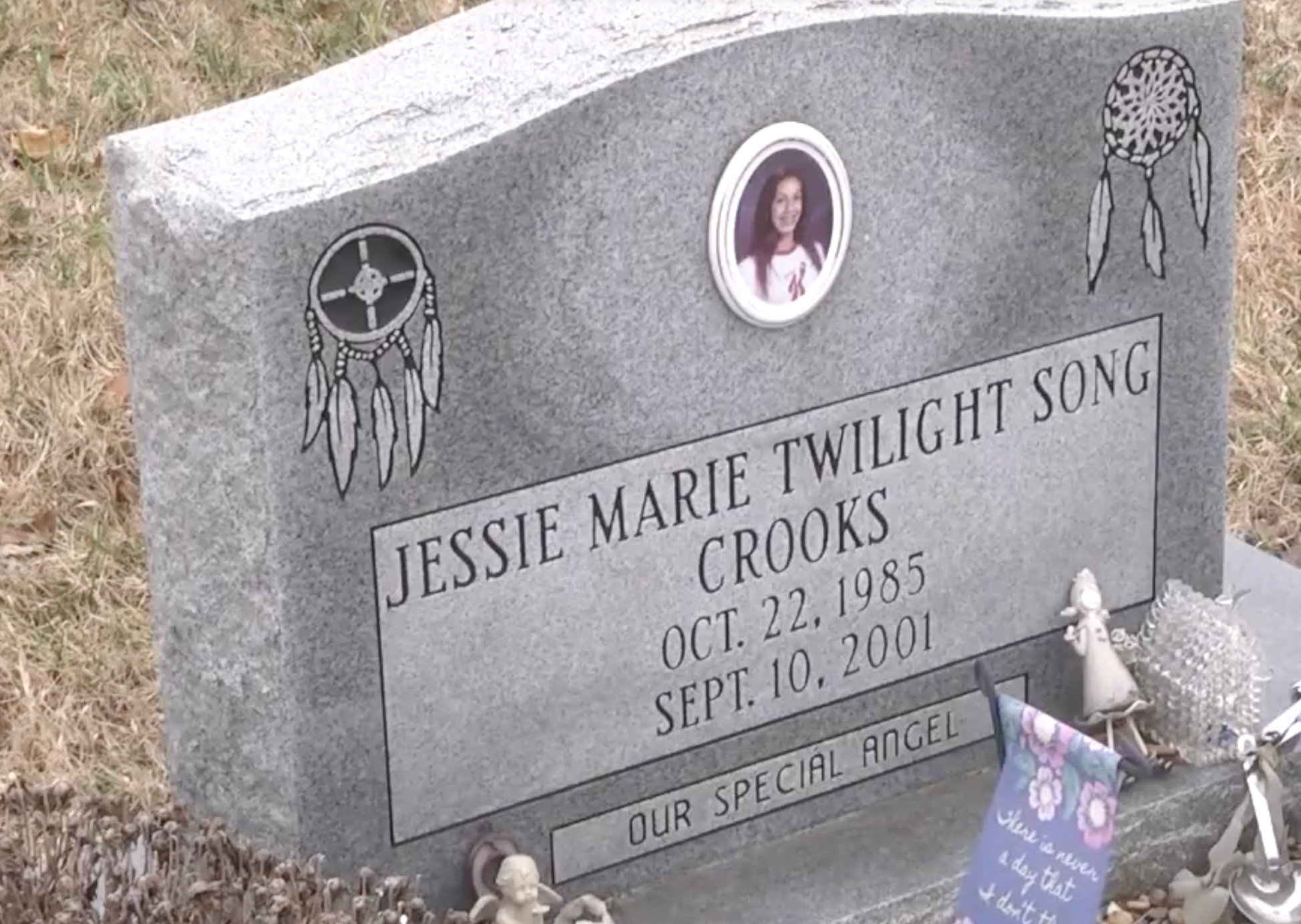A teenage girl was found dead after a mysterious phone call. Two decades later, the case is being reopened
Twilight Crooks disappeared not long after answering a payphone by the Plano County Store in rural Kentucky the day before 9/11. After a frantic two-week search, her body was found — dressed in a sweater no one recognized. Skylar Baker-Jordan reports on a case that seemed impossible to solve, but is being investigated again after an anonymous tip


Your support helps us to tell the story
From reproductive rights to climate change to Big Tech, The Independent is on the ground when the story is developing. Whether it's investigating the financials of Elon Musk's pro-Trump PAC or producing our latest documentary, 'The A Word', which shines a light on the American women fighting for reproductive rights, we know how important it is to parse out the facts from the messaging.
At such a critical moment in US history, we need reporters on the ground. Your donation allows us to keep sending journalists to speak to both sides of the story.
The Independent is trusted by Americans across the entire political spectrum. And unlike many other quality news outlets, we choose not to lock Americans out of our reporting and analysis with paywalls. We believe quality journalism should be available to everyone, paid for by those who can afford it.
Your support makes all the difference.Jessie Marie Twilight Song Crooks, known to those who loved her simply as Twilight, was a precocious teenage girl with a thousand-watt smile. Naturally athletic, she loved swimming and playing soccer. She spent her days as a sophomore hanging out with friends and socializing with peers at Greenwood High School in Bowling Green, Kentucky, where she was a straight-A student with dreams of attending Harvard University. “The world was really open to her,” her father, Bobby Crooks, told the Bowling Green Daily News in 2011, ten years after his daughter was found murdered near a dried-up pond in rural Warren County, Kentucky. The killer has never been found.
Late in the evening of August 28, 2001, Twilight received a phone call from a payphone outside the Plano Country Store. Not long afterwards, at around 11:00 PM, she left her house barefoot. Walking barefoot wasn’t necessarily out of character for Twilight, but those who knew her say that it definitely indicated she only intended to be gone a short while.
Twilight left no note nor told anyone where she was going or who she was meeting, as far as investigators know. It is believed, however, that she knew whomever she left her house to see that day.
It was the last time she would be seen alive. The next morning, upon realizing she was missing, Bobby and his wife, Linda – Twilight’s stepmother – reported their daughter missing. “When no one knew where she was and no one had any ideas, I think there was a sense of panic,” Bobby told the Daily News.
I first heard of Twilight’s case in the mid-2000s, when I lived with one of her high school classmates in Bowling Green, a sleepy southern town of just over 73,000 people located approximately halfway between Louisville, Kentucky and Nashville, Tennessee. Like a Currier and Ives print, Bowling Green is idyllically all-American. Indeed, it is the town I always imagined raising my family in, taking them in the morning to pick apples at Jackson’s Orchard and in the afternoon for fresh ice cream at Chaney’s Dairy Barn. September brings muggy days and a hot air balloon and barbecue festival. The town is considered friendly and safe.
Yet, Twilight was not safe in the area. Following a two-week frantic search by her parents, her community, and police, her body was found in what is now a soybean field. It was little more than 15 miles from the Victorian fountain burbling in a historic and picturesque square at the heart of Bowling Green’s downtown. She was 15 years old.

The search for Twilight was complicated by not just the dearth of leads, but the isolated area of southwestern Warren County in which the Crooks’ lived. Plano is located about 10 miles from downtown Bowling Green. Alternating between thick woods and fertile farmland, it makes for a beautiful country drive but a terrible place to search for a missing person because it is thick with vegetation.
It was in those one of those densely wooded areas, adjacent to an open field on Matlock Old Union Road, that Twilight’s body was found by a dog walker on Monday, September 10, 2001. Her case remains unsolved. The fact that the September 11th attacks happened the very next day is seen as one reason why her murder never gained as much attention as it should have. As the country scrambled to respond to a national attack, Twilight’s is just one murder investigation that appears to have fallen to the wayside.
“Things were very different in the early 2000s,” Warren County Sheriff Brett Hightower tells me in an interview with The Independent. “We didn’t have video cameras, cell phones, tracking.”
Because of the nature of when and where Twilight lived and died, her case has remained difficult for local authorities to crack. There is no way of telling who placed the phone call to her at the payphone that night, Sheriff Hightower says. DNA technology was not as advanced as it is today.
And, of course, we are talking about late summer in Kentucky; after being exposed to the elements for so long, a lot of evidence was no doubt lost from the crime scene. “In an indoor, more controlled environment, I think you have a better ability to have everything contained,” Sheriff Hightower says.
These facts have made solving Twilight’s case difficult, and there remain many unknowns about her disappearance and murder. Her cause of death has never been released, and while investigators have identified one person of interest, no name has ever been made public. “We don’t know what the party or parties that were responsible for this, what they did those days following [the murder] and how they may or may not have covered tracks and all those things,” Sheriff Hightower explains. “So, you’ve got time, you’ve got environment, and then you’ve got the collection of that particular evidence.”
What is known is that Twilight left her house barefoot after that phone call. Her body was found dressed in pants and a blue Edmonson County High School jersey emblazoned with the number 10. But Twilight attended Greenwood High School. Police were able to track down where that jersey came from, and found out that it had been donated to a local thrift store before coming into her possession. Family and friends, however, do not recall having seen the jersey before.
How Twilight came into possession of the jersey remains an open question. It is possible that whoever she met gave her the jersey, and it is likely that person was the last person to see her alive.
Indeed, much of what happened to Twilight immediately before and after she disappeared remains a mystery. “I have a beautiful daughter, and a certain part of me wants to keep that image,” Bobby Crooks said in 2011. “I’ll eventually have to know. But it hasn’t bothered me for the last 10 years to not know. I’ve got this image of her growing up, what she looked like and how she acts. That’s what we hold on to.”
Some information – such as the cause of death – police have deliberately not released. We do not know how long Twilight had been dead before she was found. Nor do we have a motive. Still other information, such as who she met, where they rendezvoused, and why she went to see them remain a mystery even to those closest to Twilight. “Who would have done it? Why would they have done it?” Bobby Crooks said in an interview with local news station WNKY in 2019. “There are no answers. We don’t have any answers.”
Bobby and his wife Linda declined to speak to The Independent. “They have been down this road many times and each time it is opening old wounds,” Sheriff Hightower said in an email to me. And it is understandable that they may feel this way. More than two decades since their daughter was killed, we are no closer to solving the case of the Crooks’ murdered child than we were the day she was found. Reliving that traumatic period for public consumption again and again, without their efforts bearing results, is surely painful.
However, some small progress has been made following media attention — even as recently as 2021. That year, authorities obtained a search warrant for a property based on information in a tip they received after local media reported on the case. Sheriff Hightower enlisted the FBI to help in the execution of the warrant. “Because of the size of this property and the expertise of some of their potential analysis utilizing Luminol and other resources they had available, we wanted to have them collect all the evidence,” he explains.
Luminol testing allows for traces of blood to be found even years after a crime. The chemical interacts with the hemoglobin in the blood to create a blue-tinted light showing where blood is present. The FBI collected the evidence, which was then turned over to the Warren County Sheriff’s Department and sent on to the state laboratory. They are still waiting for the results — labs across the country are backlogged with the number of such submissions they receive from authorities. Sheriff Hightower hopes they will receive the results in the next 99 days.
A few true crime websites and vloggers have picked up Twilight’s story, most notably Lamont at Large on YouTube who just last year filmed a video at the location in which Twilight’s body was found after I encouraged him to investigate the case. However, national media attention around Twilight’s murder has been lacking. Some have speculated that this could be because Twilight is of Native descent. Arapaho on her mother’s side, she often spent time with her maternal family in New Mexico, where she embraced Arapaho culture and made traditional beadwork for her family and friends back in Kentucky.
“White women do garner much more media attention,” says Summer Wesley, a former tribal attorney and current social worker who is a member of the Choctaw Nation. “There’re stereotypes about us where we’re hypersexualized, and there’s an assumption very often that we do a lot of those things that would be considered ‘high-risk lifestyle.’ Whether it’s reality or not, that is often the assumption.”
The fact that Twilight has not received the same level of coverage as other cases is frustrating, Sheriff Hightower concedes. “I wish it did,” he says. “From a law enforcement perspective, the more that we can keep this on the front pages and on the front burner, then I think that the more opportunity there is that may it will resonate with that key person who is holding that particular piece of valued information that could really help unleash the rest of this case.”
Sheriff Hightower was elected in 2016, and many of the folks involved in the initial investigation have retired or will soon retire. While the sheriff’s department is dedicated to solving this case – Hightower spoke to the Crooks family when he was campaigning for the office and has continued investigating the case, including utilizing new technologies – institutional memory is in danger of being lost, and as time goes by, there is a real possibility that those who know what happened to Twilight will die before they speak.
That doesn’t mean Sheriff Hightower is not dedicated to bringing her killer or killers to justice. The Warren County Sheriff’s Department has reopened and is actively investigating the case. “I don’t mind spending any amount of money if we can solve this case,” Hightower says, pointing out that there are now a lot of private companies able to do sophisticated DNA analysis beyond the purview of a local police department.
However, it is important that any evidence is able to withstand scrutiny in a courtroom. “At the end of the day, you have to have some type of physical evidence that is able to be conducted, an analysis that has been proven with the scientific method [and] that can actually stand up in a court of law,” he says. “The worst-case thing we could ever do is not have just an excellent case where we absolutely know that the person that we eventually will go after, or persons that we go after, that they’re the ones who did it.”
In the meantime, Twilight remains a tragic statistic. There is an epidemic of missing and murdered Indigenous women (MMIW) across North America, many of their cases remaining unsolved. According to the Crime Report – a website of the Center on Media, Crime, and Justice at the John Jay College of Criminal Justice in New York – the FBI reported 5,203 missing Indigenous girls and women in 2021. They are, the college reports, “disappearing at a rate equal to more than two and a half times their estimated share of the US population”. Many suspect the official numbers to be even lower than the actual numbers of missing women.
Meanwhile, Twilight’s family is left without any definitive answers. “There are a million things that run through your mind,” her father Bobby told WNKY in 2019. “Who would have done it? Why would they have done it? There are no answers. We don’t have any answers.”
Anyone with information on the murder of Twilight Crooks is encouraged to call the Warren County Sheriff’s Office at 1-270-842-1633 or to leave an anonymous tip using the Sheriff’s Office’s anonymous tip form, which can be found by clicking here.